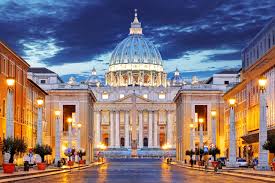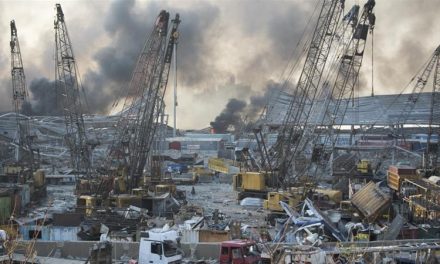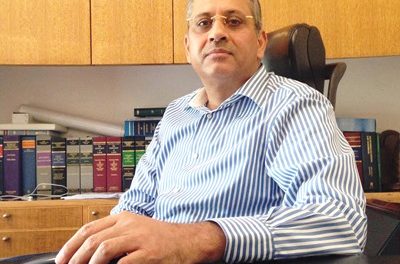10 February 2017
“There is corruption in the Vatican,” the Pope told members of the Union of Superiors General, according to a report of the meeting released by the Italian Jesuit magazine La Civilta Cattolica. He said he is at peace in his work reforming the church’s command structures. “I do not take tranquilizers!” Francis joked. He was responding to a question asked by one of the religious leaders how he maintains serenity in his work.
Pope said, in reply to a question on financial corruption, “the Lord strongly wants consecrated people to be poor.”
“When they are not, the Lord sends a bursar who leads the Institute to bankruptcy!” he said. The basic quality of a bursar “is not to be personally attached to the money,” he said.
Pope Francis created a new economy ministry to centralize operations, strengthened the power of the Vatican’s Financial Intelligence Authority, greatly improved transparency of financial reporting and appointed a general auditor. The Vatican Bank is estimated to hold $6.4 billion in deposits while its assets, which include large collections of art and real estates, are worth over $3 billion.
On the point of sexual abuse, the Pope noted that frequently abusers have themselves been victims of abuse before committing their own acts, and “abuse is thus sowed into the future and this is devastating.”
“If priests or religious are involved, it is clear that the devil is at work, who ruins the work of Jesus through those who should proclaim him,” he said. Never receive to the religious life or to a diocese candidates that have been rejected from another seminary or from another Institute without asking for clear and detailed information on the motivations for their moving away,” the pontiff advised.
“There is corruption in the Vatican,” the Pope told members of the Union of Superiors General, according to a report of the meeting released by the Italian Jesuit magazine La Civilta Cattolica. He said he is at peace in his work reforming the church’s command structures. “I do not take tranquilizers!” Francis joked. He was responding to a question asked by one of the religious leaders how he maintains serenity in his work.
Pope said, in reply to a question on financial corruption, “the Lord strongly wants consecrated people to be poor.”
“When they are not, the Lord sends a bursar who leads the Institute to bankruptcy!” he said. The basic quality of a bursar “is not to be personally attached to the money,” he said.
Pope Francis created a new economy ministry to centralize operations, strengthened the power of the Vatican’s Financial Intelligence Authority, greatly improved transparency of financial reporting and appointed a general auditor. The Vatican Bank is estimated to hold $6.4 billion in deposits while its assets, which include large collections of art and real estates, are worth over $3 billion.
On the point of sexual abuse, the Pope noted that frequently abusers have themselves been victims of abuse before committing their own acts, and “abuse is thus sowed into the future and this is devastating.”
“If priests or religious are involved, it is clear that the devil is at work, who ruins the work of Jesus through those who should proclaim him,” he said. Never receive to the religious life or to a diocese candidates that have been rejected from another seminary or from another Institute without asking for clear and detailed information on the motivations for their moving away,” the pontiff advised.
As a further measure of increasing transparency, Pope Francis, who took office on 13 March 2013, appointed in 2014, an international group of eight cardinals and seven lay experts in the fields of business to form a new Council for the Economy. The Council will study accounting practices among all Vatican offices and devise new strategies for greater fiscal responsibility and transparency. German Cardinal Reinhard Marx of Munich and Freising will head the Council. Other cardinals on the Council are:
South African Cardinal Wilfrid Napier of Durban, 73.
Mexican Cardinal Norberto Rivera Carrera of Mexico City, 71.
Peruvian Cardinal Juan Cipriani Thorne of Lima, 70.
French Jean-Pierre Ricard of Bordeaux, 69.
Cardinal John Tong Hon of Hong Kong, 74.
Italian Cardinal Agostino Vallini, papal vicar for Rome, 73.
US Cardinal Daniel DiNardo of Galveston-Houston
South African Cardinal Wilfrid Napier of Durban, 73.
Mexican Cardinal Norberto Rivera Carrera of Mexico City, 71.
Peruvian Cardinal Juan Cipriani Thorne of Lima, 70.
French Jean-Pierre Ricard of Bordeaux, 69.
Cardinal John Tong Hon of Hong Kong, 74.
Italian Cardinal Agostino Vallini, papal vicar for Rome, 73.
US Cardinal Daniel DiNardo of Galveston-Houston
The lay members of the Council for the Economy are:
Joseph Zahra, a Maltese business consultant and former director of the Central Bank of Malta, who helped clients “improve corporate performance,” according to a Vatican press release.
Jean-Baptiste de Franssu, a French expert in business administration and asset management.
John F. Kyle, who holds both U.S. and Canadian citizenship, is a retired vice president and treasurer of Exxon-Mobil’s Imperial Oil company in Canada. He taught economics at Northwestern University in Evanston, Ill., and New York University, and worked on various audit committees and finance councils in Canada, including for the Archdiocese of Toronto.
Enrique Llano Cueto, a Spanish economist, accountant and business consultant.
Jochen Messemer, a German manager with experience in the health care, insurance and financial service industries. He has also served since 2009 as an international auditor of the Prefecture for the Economic Affairs of the Holy See — the Vatican’s budget management office.
Francesco Vermiglio, an Italian expert in accounting and corporate finance.
George Yeo, former finance minister of Singapore, former chief-of-staff of the Singapore armed forces and director of joint operations and planning in the defense ministry.
Joseph Zahra, a Maltese business consultant and former director of the Central Bank of Malta, who helped clients “improve corporate performance,” according to a Vatican press release.
Jean-Baptiste de Franssu, a French expert in business administration and asset management.
John F. Kyle, who holds both U.S. and Canadian citizenship, is a retired vice president and treasurer of Exxon-Mobil’s Imperial Oil company in Canada. He taught economics at Northwestern University in Evanston, Ill., and New York University, and worked on various audit committees and finance councils in Canada, including for the Archdiocese of Toronto.
Enrique Llano Cueto, a Spanish economist, accountant and business consultant.
Jochen Messemer, a German manager with experience in the health care, insurance and financial service industries. He has also served since 2009 as an international auditor of the Prefecture for the Economic Affairs of the Holy See — the Vatican’s budget management office.
Francesco Vermiglio, an Italian expert in accounting and corporate finance.
George Yeo, former finance minister of Singapore, former chief-of-staff of the Singapore armed forces and director of joint operations and planning in the defense ministry.
The Council which will report directly to the pope, was set up with a personal decree known as a “chirografo”, will bypass the Vatican’s Secretariat of State, which has been hit by allegations of scandal and corruption.















